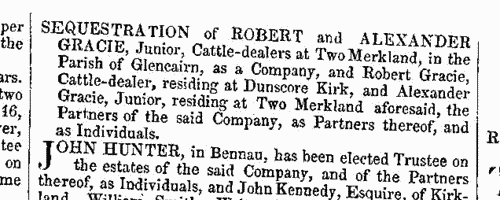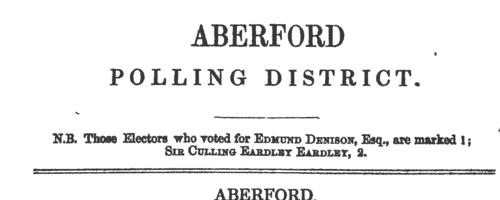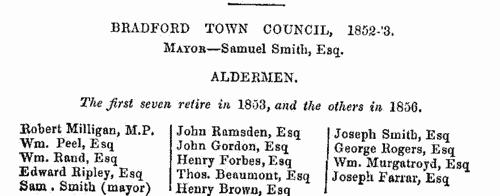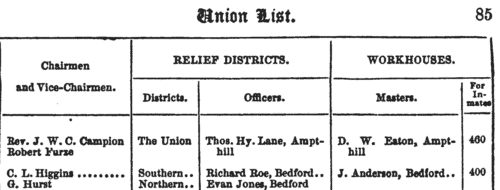Wharf Surname Ancestry ResultsOur indexes 1000-1999 include entries for the spelling 'wharf'. In the period you have requested, we have the following 42 records (displaying 21 to 30): Single Surname Subscription | | | Buying all 42 results of this search individually would cost £244.00. But you can have free access to all 42 records for a year, to view, to save and print, for £100. Save £144.00. More... |
These sample scans are from the original record. You will get scans of the full pages or articles where the surname you searched for has been found. Your web browser may prevent the sample windows from opening; in this case please change your browser settings to allow pop-up windows from this site. Bankrupts in England and Wales petitioning for discharge
(1846)
Perry's Bankrupt and Insolvent Gazette, issued monthly, included lists of bankruptcies and stages in the liquidation of the estate, payment of dividends, and discharge. Towards the end of the process there was a Meeting for Allowance of Certificates, where the bankrupt applied for a certificate of discharge. This meeting sometimes took place many years after the bankruptcy procedure started: the details given are the year originally gazetted, name (surname first), address, and trade; and the date and time of the hearing. This is the index to the names of the bankrupts, from the issues from January to December 1846.WHARF. Cost: £6.00.  | Sample scan, click to enlarge

| The Edinburgh Gazette
(1846)
The Edinburgh Gazette is the official publication in which various Scottish legal notices are issued, as well as promotions and casualty lists for the British army as a whole, and brief lists of English bankrupts. The key source for tracing details of Scottish bankruptcies, insolvencies, and dissolutions of business partnerships.WHARF. Cost: £6.00.  | Sample scan, click to enlarge

| Electors for Gargrave
(1848)
On 14 and 15 December 1848 an election took place for a Knight of the Shire for the West Riding of Yorkshire in the House of Commons. The candidates were Edmund Denison and sir Culling Eardley Eardley, gaining 14,743 and 11,795 votes respectively. The county franchise at this period included freeholders of land worth 40s or more a year; £10 copyholders and long-leaseholders; and £50 short-leaseholders and tenants. This poll book was published in 1849.
Former poll books had been compiled from the sheriff's returns; but as these were now transmitted to the Home Office immediately after an election, in this instance the polling was marked from the check-clerk's returns, carefully compared with the registers marked in the poll booths at the time of voting.
The votes for the respective candidates are indicated by the numerals 1 (Denison) and 2 (Eardley). The omission of these numerals indicates that the elector did not vote. Many names which appear on the register of particular townships are completely omitted in this poll book: in all these cases, the same name will be found recorded in some other township, the elector having two or more qualifications. In such cases, his name only appears in the poll book in the actual township for which he chose to vote; or, if he did not vote at all, in that township for which he was qualified that lay closest to his actual residence.
The townships are arranged alphabetically within polling district; and within each township the names are arranged alphabetically by surname and christian name, and the elector's residence is given. Many of the electors resided outside the township for which they were qualified - some in other counties. Moreover, at the end of each polling district there is a list of persons registered to poll in that district, from townships is other districts. WHARF. Cost: £6.00.  | Sample scan, click to enlarge

| Inhabitants of Bradford, Yorkshire
(1853)
William White's directory lists traders, farmers and private residents in the area.WHARF. Cost: £6.00.  | Sample scan, click to enlarge

| Inhabitants of Skipton, Yorkshire
(1853)
William White's directory lists traders, farmers and private residents in the area.WHARF. Cost: £6.00.  | Sample scan, click to enlarge

|  Persons of standing recommending London police recruits
(1843-1857) Persons of standing recommending London police recruits
(1843-1857)
The Metropolitan Police Register of Joiners (MEPO 4/334) lists policemen joining the force 1 January 1843 to 1 April 1857 (warrant numbers 19893 to 35804). The register is alphabetical, in so far as the recruits are listed chronologically grouped under first letter of surname. It gives Date of Appointment, Name, Number of Warrant, Cause of Removal from Force (resigned, dismissed, promoted or died), and Date of Removal. Although the register was closed for new entrants at the end of 1842, the details of removals were always recorded, some being twenty or more years later. Those recruits not formerly in the police, the army, or some government department, were required to provide (normally) at least two letters of recommendation from persons of standing, and details of these are entered on the facing pages. Where a recruit was only recently arrived in the metropolis, the names and addresses of the recommenders can be invaluable for tracing where he came from. Those recruits not formerly in the police, the army, or some government department, were required to provide (normally) at least two letters of recommendation from persons of standing, and details of these are entered on the facing pages: the names in these are indexed here (the police recruits are indexed separately and not included here). Recruits transferred from other forces or rejoining the force did not normally need recommendations - in the latter case, former warrant numbers are given - but some recommendations are from police inspectors, even other constables. Recruits coming from the army sometimes have general military certificates of good conduct, but most often have a letter from their former commanding officer; recruits recommended by government departments (most often the Home Office) similarly have letters from the head of department. But the great majority of the names and addresses in these pages are of respectable citizens having some sort of personal acquaintance with the recruit. Where more than two recommendations were provided, the clerk would only record one or two, with the words 'and others'. Tradesmen are sometimes identified as such by their occupations; there are some gentry. Although the bulk of these names are from London and the home counties, a scattering are from further afield throughout Britain and Ireland. WHARF. Cost: £8.00.  | Sample scan, click to enlarge

| Long-stay Paupers in Workhouses: Poplar Union
(1861)
This comprehensive return by the Poor Law Board for England and Wales in July 1861 revealed that of the 67,800 paupers aged 16 or over, exclusive of vagrants, then in the Board's workhouses, 14,216 (6,569 men, 7,647 women) had been inmates for a continuous period of five years and upwards. The return lists all these long-stay inmates from each of the 626 workhouses that had been existence for five years and more, giving full name; the amount of time that each had been in the workhouse (years and months); the reason assigned why the pauper in each case was unable to sustain himself or herself; and whether or not the pauper had been brought up in a district or workhouse school (very few had). The commonest reasons given for this long stay in the workhouse were: old age and infirm (3,331); infirm (2,565); idiot (1,565); weak mind (1,026); imbecile (997); and illness (493). WHARF. Cost: £6.00.  | Sample scan, click to enlarge

| Masters of Workhouses: Lancashire
(1863)
Most Poor Law Unions maintained a workhouse. The Union List for 1863, arranged by counties and unions, and spread across facing pages, gives in the final columns the names of the masters of each workhouse, and the number of inmates. This number is the number fixed by the Poor Law Board. A few related institutions - Houses of Industry for Out-door Poor, Industrial Schools, Houses of Recovery, &c., are also included, and there are also some masters of workhouses outside the Poor Law Union system maintained by parishes under local acts, and in Gilbert's Incorporations. All the masters and matrons are included in this index.WHARF. Cost: £6.00.  | Sample scan, click to enlarge

| Voters in Macclesfield: Hurdsfield Ward
(1879-1880)
The electoral register for 1879-1880, for parts of Hurdsfield, Macclesfield and Tytherington, in Cheshire.WHARF. Cost: £6.00.  | Sample scan, click to enlarge

| Debtors
(1880)
Bills of sale (binding assets to a creditor/lender) in England and Wales, October to December 1880WHARF. Cost: £6.00.  | Sample scan, click to enlarge

|
Research your ancestry, family history, genealogy and one-name study by direct access to original records and archives indexed by surname.
|













